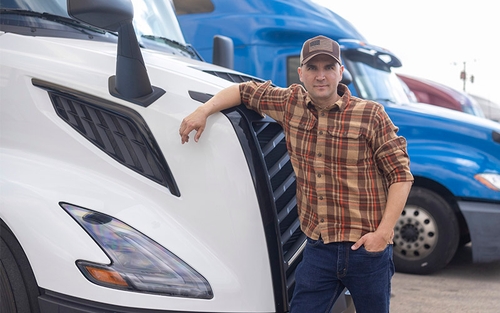7 things to consider when writing a trucking business plan
July 25, 2024

Estimated reading time: 3 minutes
Before you start a trucking company, it’s a good idea to create a well-thought-out business plan. This plan will help you understand what to expect as an owner-operator and the costs associated with running a trucking business.
Here are seven things to think about as you put together your trucking business plan, along with an example for reference.
Items to consider in a business plan for a trucking company
1. Decide where you plan to run your business.
When you’re starting a trucking company business plan, the first thing you’ll need to decide is what state(s) your business will operate in. This will determine:
- What registration filings you’ll need to complete (UCR, IRP, IFTA, etc.).
- The geographic location where you will get your loads.
- What opportunities you’ll be open to.
2. Consider how you will run your business.
Owner-operators can choose to do business with a carrier and run under its authority, or they can operate under their own authority.
The route you choose will dictate a few things for your business, including:
- What insurance you’ll need to obtain.
- Whether you need to get a USDOT and MC number.
- What compliance requirements you’ll have to follow.
- How you will get your loads.
Reviewing an owner-operator startup checklist will provide more details on how each item is impacted based on how you choose to run your business.
3. Research what business structure you want to follow.
Next, choose which business structure is the best fit for your business. Will you run your business as:
- A sole proprietor?
- A limited liability company (LLC)?
- A corporation?
- A partnership?
Each business structure has its benefits and challenges. It’s a good idea to seek professional legal and tax advice to help determine which one is the best type for your trucking business.
4. Determine what type of freight your business will haul.
There are many options available when it comes to the type of freight your business hauls. Some opportunities include:
- Dry van freight.
- Tanker loads.
- Flatbed loads.
- Shipping containers.
- And more.
Make sure whatever opportunity you choose is a good fit for you and your business goals. Ask yourself:
- What option will fit my lifestyle?
- What endorsements will I need?
- How much experience is required?
- What is freight availability like?
5. Figure out how your business will get freight.
Finding the right loads for your business to haul is very important. It will directly impact your business’ overall profitability.
How you choose to run your business will affect the way your business gets loads to haul.
If you run under your own authority
Owner-operators who run under their own authority may work with freight brokers or a dispatching service to help them find freight. They can also use public load boards to access the spot market.
If you do business with a carrier
Owner-operators who do business with a carrier, like Schneider, can typically select freight from the carrier’s private load board.
6. Select your equipment.
The type of freight you decide to haul and how often you want to get home will determine what equipment you need to get. Equipment considerations include things like:
- Sleeper and day cabs.
- Dry van trailers.
- Tanker trailers.
- Flatbed trailers.
- Curtain side trailers.
7. Calculate your business’ expected costs and revenue goals.
To be a successful owner-operator, you need to have an idea of what your biggest expenses will be. Business costs may include things like:
- Truck payments.
- Trailer payments.
- Plates and registration.
- Maintenance.
- Fuel.
- Taxes.
- Insurance.
Once you know how much it’ll cost to run your trucking business, you can set a realistic number for the revenue you want your business to generate.
Trucking business plan example
Company overview
XYZ Trucking LLC started in 2024 and will operate under Schneider’s authority in the southeastern United States as a van truckload owner-operator.
Operational plan
XYZ Trucking will pick dry van loads from Schneider’s private load board. We will focus on selecting freight in Florida, Georgia, South Carolina, North Carolina and Tennessee.
Equipment procurement
XYZ trucking purchased one used semi-truck directly from Schneider. XYZ trucking will haul Schneider’s trailers at no cost to the business.
Business projections
Anticipated monthly expenses:
- Fuel: X
- Maintenance: X
- Insurance: X
- Taxes (quarterly): X
- Food: X
XYZ Trucking’s annual revenue goal is X.



